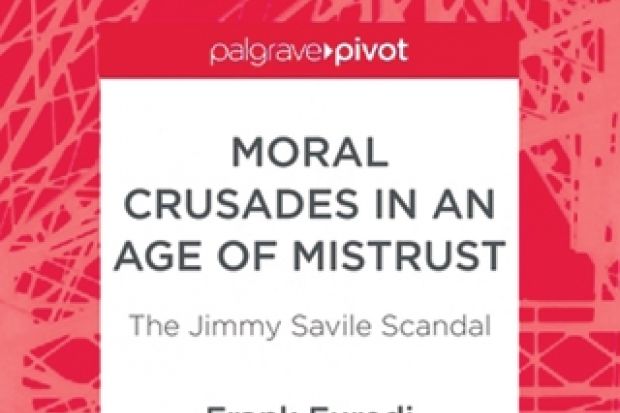Frank Furedi sets out to do two things in this book. First, he analyses the media circus that ensued after the 2012 airing of a BBC Newsnight report on allegations of sexual abuses committed by the entertainer Jimmy Savile; it presented, among other things, false allegations against Lord McAlpine, and in its wake came the resignation of BBC director-general George Entwistle and widespread journalistic licence that prompted Prime Minister David Cameron to warn against witch-hunts. Second, he examines how such scandals point to the desire for moral surety and moral crusade in a time of deep social disconnection.
On the first point, Furedi succeeds in showing how such scandals take on unruly lives of their own. He chronicles the increasingly hyperbolic nature of coverage of the Savile story, and raises important points about the “open secret” of Savile’s predilections and how criticism of the hedonism of the 1960s and 1970s displaced consideration of the tacit consent offered by those around Savile at the time.
But it is in Furedi’s second aim - explanation of the sociological mechanism of crusades - that his analysis ultimately falls short. He rightly asserts that the body of the child and its safety has become one of the last sacred spaces in a fragmented culture. Reports of its violation thus prompt a collective focus on moral boundary-setting that can have dangerous consequences. As he notes: “Savile’s abuse of children should be interpreted as the catalyst that unleashed the pre-existing mistrust and resentment of unsettled and uncertain moral communities.” For Furedi, shifts in the social construction of the child (as more sacred than utilitarian), anxious parenting, fears about “toxic childhoods”, the rise of victim culture and extension of the term “abuse” are all to blame.
What is lost is the way each of these points relates back to the Savile case and any sense of the sociological nuance surrounding what it means to live in a culture in which constructing singular monsters dilutes the complexity of the sexual exploitation of children and young people. Indeed, after the first three of eight very short chapters, Moral Crusades in an Age of Mistrust reads like an unfocused rant against a culture bent on hindering individual freedom, a culture where being a victim is apparently more desirable than individual achievement and where everything is seen as abuse.
What is most astonishing, however, is that any consideration of feminism, other than via a few derisive sentences, is completely absent from this text. For example, in his chapter on the social construction of abuse discourse, Furedi fails to mention that the concept of sexual abuse was a feminist response to actual violence against children.
Unlike authors such as James Kincaid, Steven Angelides, Dany Nobus, Karen Sternheimer and Philip Jenkins whose work carefully probes our culture’s narratives to render visible our paradoxical and vexed relationship to children, sexuality and sexual abuse, Furedi seems all too ready to settle into a reductionist argument about moral crusades. Because of this, what he cannot seem to hold in the balance is that the issue of child sexual abuse is deeply complex: that while children are sexually exploited more often than not in the home (or very close to it), our culture focuses on the threat of “stranger danger”; that there are systems of laws in place regarding paedophilia that are draconian at best and inhumane at worst, leaving little room for the harder work of restorative justice in families and communities (including the excellent work of the activist organisation Generation Five); that power difference and violence are not uncommon in molestation but that not all individuals who have experienced intergenerational sex view their relationships within this frame; and finally, as numerous studies have shown, that in addition to our penchant for innocence, our culture is also deeply suspicious of children and their sexuality.
Much like the recent Jerry Sandusky case in the US, what the Savile case illuminates is how stories of the past are often what psychoanalysts refer to as “screen memories”, and that reducing this case to the story of an evil individual serves to repress discussion of far more painful issues of violence in extended families, institutional neglect and our unresolved cultural ambivalence about children and sexuality.
Moral Crusades in an Age of Mistrust: The Jimmy Savile Scandal
By Frank Furedi
Palgrave Macmillan, 116pp, £22.50
ISBN 9781137338013
Published 19 March 2013
Register to continue
Why register?
- Registration is free and only takes a moment
- Once registered, you can read 3 articles a month
- Sign up for our newsletter
Subscribe
Or subscribe for unlimited access to:
- Unlimited access to news, views, insights & reviews
- Digital editions
- Digital access to THE’s university and college rankings analysis
Already registered or a current subscriber? Login




